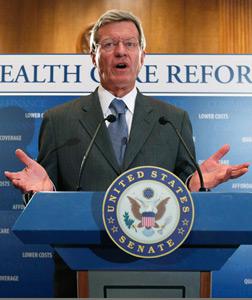Suffer the Little Children
How Baucus' health care bill panders to the young.
By Timothy Noah
One of the more annoying components to Sen. Max Baucus' just-released "chairman's mark" is its creation of a special category of private health insurance policy to be offered to a group known in insurance circles as "young invincibles." These are people 25 years or younger who don't understand what all this health care fuss is about because they are going to live forever and therefore have no use for doctors. One-third of them carry no health insurance, and they account for nearly one-third of the uninsured.
If health reform is going to include an "individual mandate" compelling people to buy health insurance, as this one does, then it would seem logical to have young invincibles buy health insurance in large pools that include older, typically less healthy people. Insurance, after all, works only to the extent that it can spread risk among a diverse population. But the Baucus bill invites private insurers to create a special category of insurance available only to those people least likely to become ill. The insurance would be catastrophic, i.e., it would cover only the most dire and expensive medical calamities that might befall an invincible. No such provision appears in the other health reform bills.
As Erika Lovley noted recently in Politico, President Obama's enthusiastic supporters among the young aren't particularly enthusiastic about health reform. It will, after all, require them to buy something they probably won't need. Baucus' young-invincibles option is a sop to them. By isolating invincibles from people far more likely to draw health benefits, Baucus guarantees they won't have to pay much in health premiums. The option is also a sop to insurers, who will see this as a fantastically profitable opportunity to sell health insurance to people who almost never get sick. They are in the position of an ice maker who just found out the government is forcing Eskimos to buy ice cubes.
Everybody else gets screwed. By inviting the young to opt out of larger health insurance pools, Baucus guarantees that health insurance will be that much costlier for people over age 25.
The line that really bugged me was, "Insurance, after all, works only to the extent that it can spread risk among a diverse population." That's complete nonsense. Insurance works because insurers use information about the customer to determine a probability that they would need a claim. They then take a large number of people and rely on the law of large numbers to even out the periods of good and bad luck. Diversity has nothing to do with it. Size of population is what matters.
Timothy Noah is basically saying that a car insurance company can only stay in business if it has both good and bad drivers buying policies. Obviously that's horse****. A company might specialize in offering low rates to good drivers, or high rates to bad drivers, or it might go after both markets. But what keeps an insurance company in business is having a large number of clients, so that a rash of bad luck doesn't drive it out of business.
Am I right about this, or am I completely misinformed? And if I'm right, why the hell would Timothy Noah think that diversity is the key to successful insurance?
The proposal looks great to me. Young people are less likely to get sick than older people, but that's why insurance is so great. A relatively low fee means that if I do get into a serious accident, or get seriously ill, I could still afford coverage. Young people need insurance, they just don't need to subsidize insurance for less healthy old people.

Comment